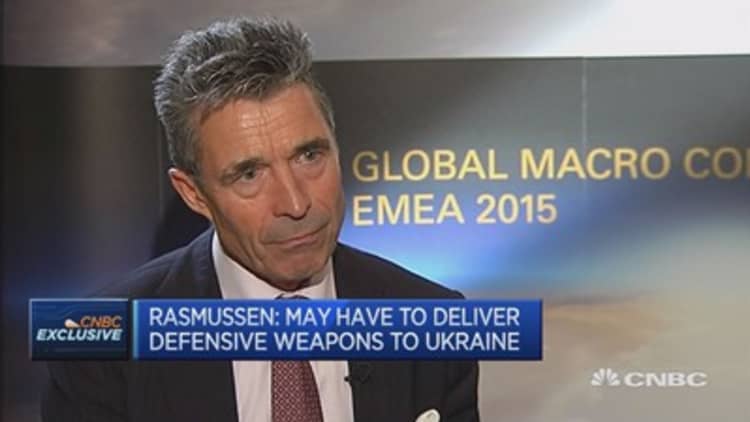
The Russia-Ukraine crisis could last decades, the former secretary general of NATO has warned, telling CNBC that the West should consider arming the Ukrainians in a fight that is "part of a bigger Russian master plan."
Anders Fogh Rasmussen, who led the international military alliance of NATO between 2009 and 2014, said that Russia continued to destabilize Ukraine, with "tens of thousands" of troops amassed along the Russian-Ukrainian border and "actively operating" within the country.
"We are all hoping to see a peaceful political solution to this crisis because basically there is no military solution," Rasmussen told CNBC on Monday.
"The problem is that the Russians seem to think there is a military solution, so they continue to destabilize the situation in Ukraine and my point is, if this continues, I think the time has come to consider the delivery of defensive weapons to the Ukrainians so that they can defend themselves, at least."
Read MoreNATO: CNBC explains
During Rasmussen's tenure at NATO, relations between the West and Moscow dramatically deteriorated after Russia invaded Ukraine and annexed its historically disputed Crimea region in March 2014.
Fighting in Ukraine continues between government forces and pro-Russian separatists, who are reported to be sponsored by Moscow.
"In that situation we have more or less an obligation to help the Ukrainians defend themselves," Rasmussen told CNBC.
On Monday, U.S. President Barack Obama said that the G-7 group of major countries was willing to continue or even extend sanctions against Moscow, despite concerns from some European nations about the risk of retaliation.
Read MoreNo place for Putin at G7: Canadian PM
Rasmussen was pessimistic about the conflict dying down, saying Russia was deliberating destabilizing its neighbors—not just Ukraine—with the aim of resurrecting Moscow's once-expansive sphere of influence.
He highlighted Russia's role in Transnistria, the breakaway state that is formally part of Moldova, as well as Georgia's separatist states of Abkhazia and Ossetia.
"This is not just about Crimea; it is not just about Ukraine; it is part of a bigger Russian master plan to re-establish a sphere of Russian influence in the near neighborhood," said Rasmussen.
"To that end, the Russians want to keep the neighbors weak and prevent them from seeking integration with the European Union and NATO, and that is why Russia is interested in having these simmering or frozen conflicts in the near neighborhood."
Rasmussen spoke to CNBC from the annual Goldman Sachs global macro conference in London. Prior to joining NATO he was prime minister of his home country, Denmark. He now runs his own geopolitical consultancy, Rasmussen Global.

